Related Research Articles

Tunisia, officially the Republic of Tunisia, is the northernmost country in Africa. It is a part of the Maghreb region of North Africa, bordered by Algeria to the west and southwest, Libya to the southeast, and the Mediterranean Sea to the north and east. Tunisia also shares maritime borders with Italy through the islands of Sicily and Sardinia to the north and Malta to the east. It features the archaeological sites of Carthage dating back to the 9th century BC, as well as the Great Mosque of Kairouan. Known for its ancient architecture, souks, and blue coasts, it covers 163,610 km2 (63,170 sq mi), and has a population of 12.1 million. It contains the eastern end of the Atlas Mountains and the northern reaches of the Sahara desert; much of its remaining territory is arable land. Its 1,300 km (810 mi) of coastline includes the African conjunction of the western and eastern parts of the Mediterranean Basin. Tunisia is home to Africa's northernmost point, Cape Angela. Located on the northeastern coast, Tunis is the capital and largest city of the country, which is itself named after Tunis. The official language of Tunisia is Modern Standard Arabic. The vast majority of Tunisia's population is Arab and Muslim. Vernacular Tunisian Arabic is the most spoken, and French also serves as an administrative and educational language in some contexts, but it has no official status.
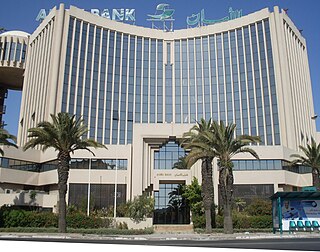
The economy of Tunisia is in the process of being liberalized after decades of heavy state direction and participation in the country's economy. Prudent economic and fiscal planning has resulted in moderate but sustained growth for over a decade. Tunisia's economic growth historically has depended on oil, phosphates, agri-food products, car parts manufacturing, and tourism. In the World Economic Forum Global Competitiveness Report for 2015–2016, Tunisia ranks in 92nd place.

The Maghreb, also known as the Arab Maghreb and Northwest Africa, is the western part of the Arab world. The region comprises western and central North Africa, including Algeria, Libya, Mauritania, Morocco, and Tunisia. The Maghreb also includes the disputed territory of Western Sahara. As of 2018, the region had a population of over 100 million people.

Djerba, also transliterated as Jerba or Jarbah, is a Tunisian island and the largest island of North Africa at 514 square kilometers (198 sq mi), in the Gulf of Gabès, off the coast of Tunisia. Administratively, it is part of Medenine Governorate of this North African country. The island had a population of 139,544 at the 2004 census, which rose to 163,726 at the 2014 census. Citing its long and unique history, Tunisia has sought UNESCO World Heritage status protections for the island, and, in 2023, Djerba was officially designated a World Heritage Site.

The Tunisia national football team represents Tunisia in men's international association football. The team is a member of both FIFA and CAF, the Confederation of African Football. It is governed by the Tunisian Football Federation, founded in 1957. Colloquially known as the Eagles of Carthage, the team's colours are red and white, and the bald eagle is its symbol. Most of Tunisia's home matches are played at the Hammadi Agrebi Stadium in Radès since 2001.
The Mali national football team represents Mali in men's international football and is governed by the Malian Football Federation. The team's nickname is Les Aigles. They represent the country at tournaments organized by both FIFA and the Confederation of African Football (CAF).
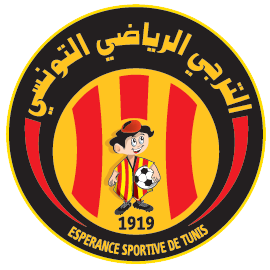
Espérance Sportive de Tunis, known as ES Tunis or simply EST for short, and nicknamed “Mkashkha”, The Elder of Tunisian Clubs, The Blood and Gold Club and The Beast of Africa is a Tunisian professional sports club. It was founded on 15 January 1919 in the Bab Souika neighborhood in Tunis. Its best known football section has been active in the first Tunisian Professional League 1 since 1936, during which it played 63 seasons, except for the 1970–71 season.

Club Africain, known as CA for short, is a Tunisian professional football club based in Tunis. The club was founded in 1920 and its colours are red and white. Their home stadium, Stade Hammadi Agrebi, has a capacity of 60,000 spectators. The club currently plays in the Tunisian Ligue Professionnelle 1.
The Tunisian Professional League 1, previously called the Tunisian National Championship between 1956 and 1994, is the top division football tournament in Tunisia under the organization of the Tunisian Football Federation. The first edition was held during the French protectorate of Tunisia, the 1907 season, under the auspices of the Federation of Union des Sociétés Françaises de Sports Athlétiques, and it was played in a knockout system, and the first official match was played on 9 June 1907.

The Tunisian Air Force is one of the branches of the Tunisian Armed Forces.
Of the religions in Tunisia, Islam is the most prevalent. It is estimated that in 2022, approximately 99% of Tunisia's inhabitants identified themselves as Muslims.

The Tunisian revolution, also called the Jasmine Revolution and Tunisian Revolution of Dignity, was an intensive 28-day campaign of civil resistance. It included a series of street demonstrations which took place in Tunisia, and led to the ousting of longtime dictator Zine El Abidine Ben Ali in January 2011. It eventually led to a thorough democratization of the country and to free and democratic elections, which had led to people believing it was the only successful movement in the Arab Spring.
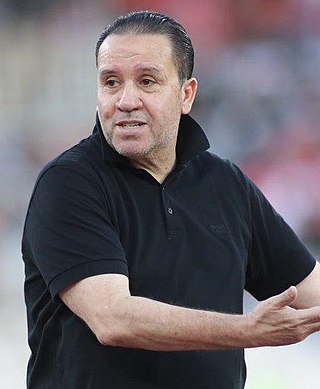
Nabil Maâloul is a Tunisian professional football manager and former footballer who played as a midfielder for the Tunisia national team.
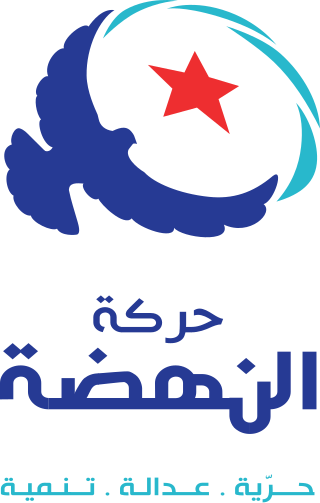
The Ennahda Movement, also known as the Renaissance Party or simply known as Ennahda, is a self-defined Islamic democratic political party in Tunisia.

Youssef Msakni is a Tunisian professional footballer who plays as a winger or forward for Qatar Stars League club Al Arabi, and captains the Tunisia national team.

The Assembly of the Representatives of the People is the lower house of the Parliament of Tunisia. The Assembly replaced the Constituent Assembly and was first elected on 26 October 2014. The legislature consists of 161 seats. Before the 2011 revolution, Tunisia's parliament consisted of an upper chamber called the Chamber of Advisors and a lower chamber called the Chamber of Deputies.
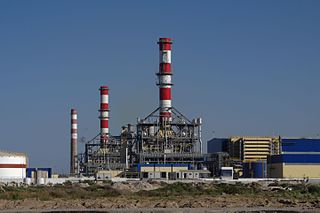
The energy sector in Tunisia includes all production, processing and, transit of energy consumption in this country. The production involves the upstream sector that includes general oil and gas, the downstream sector that includes the only refinery in Tunisia and most of the production of natural gas, and varied electrical/renewable energies. Renewable energy has been a strong point of focus for Tunisia as they look to optimize their green energy sources and advance their developing country. The Tunisian government has partnered with Russia and France in hopes of establishing nuclear energy as a viable alternative to fossil fuels and taking up a nontrivial chunk of the energy production in Tunisia. This is expected to be accomplished in the 2020s.
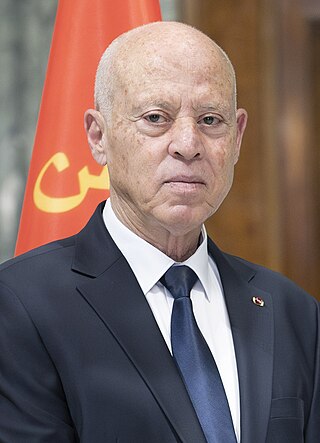
Kais Saied is a Tunisian politician, jurist and retired professor of law currently serving as the seventh president of Tunisia since October 2019. He was president of the Tunisian Association of Constitutional Law from 1995 to 2019.

Union Sportive Monastirienne, commonly known as US Monastir, is a Tunisian professional basketball club based in Monastir. Established in 1959, the team plays in the Pro A the first division league in Tunisia and has won seven national championships. Monastir also plays in the Basketball Africa League (BAL) since the inaugural season in 2021. Home games are played in the Mohamed-Mzali Sports Hall.

The 2021 Tunisian self-coup took place on 25 July 2021, when Tunisian President Kais Saied dismissed the government of Hichem Mechichi, suspended the Assembly of the Representatives of the People and revoked the immunity of its members. Described as a self-coup, the move came after a period of political instability marked by a series of protests against the Ennahda-backed government and the collapse of the Tunisian healthcare system amidst the COVID-19 pandemic in the country.
References
- ↑ Amara, Tarek (2023-03-13). "New Tunisian parliament elects its speaker in its first session". Reuters. Retrieved 2023-10-18.